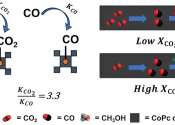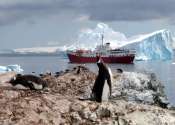New process quickly transforms livestock manure into biochar
A technology has been developed to quickly convert livestock manure, a significant issue in animal farming, into valuable "black gold" rich in carbon within a day.

A technology has been developed to quickly convert livestock manure, a significant issue in animal farming, into valuable "black gold" rich in carbon within a day.
Biotechnology
Apr 26, 2024
1
145

The NASA/ESA/CSA James Webb Space Telescope has captured the sharpest infrared images to date of one of the most distinctive objects in our skies, the Horsehead Nebula. These observations show a part of the iconic nebula ...
Astronomy
Apr 29, 2024
0
45

A "rapid and far-reaching change" is necessary to prevent catastrophic climate change, according to the Intergovernmental Panel on Climate Change (IPCC). "However, the transformation of the economy towards climate neutrality ...
Environment
Apr 15, 2024
1
86

The magnificent central bar of NGC 2217 (also known as AM 0619-271) shines bright in the constellation of Canis Major (The Greater Dog), in this image taken by the NASA/ESA Hubble Space Telescope. Roughly 65 million light-years ...
Astronomy
Apr 29, 2024
0
24

Climate change caused by CO2 emissions already in the atmosphere will shrink global GDP in 2050 by about $38 trillion, or almost a fifth, no matter how aggressively humanity cuts carbon pollution, researchers said Wednesday.
Environment
Apr 20, 2024
2
81

The impact of human activities—such as greenhouse gas emissions and deforestation—on Earth's surface have been well-studied. Now, hydrology researchers from the University of Arizona have investigated how humans impact ...
Earth Sciences
Apr 28, 2024
0
130

Researchers at the University of Michigan have developed a catalyst material known as cobalt phthalocyanine that converts carbon dioxide—a significant driver of climate change—into renewable fuels such as methanol.
Analytical Chemistry
May 6, 2024
1
227

Colonies of emperor penguin chicks were wiped out last year as global warming eroded their icy homes, a study published Thursday found, despite the birds' attempts to adapt to the shrinking landscape.
Ecology
Apr 25, 2024
2
4165

New research has found a "missing piece of the puzzle" of West Antarctic Ice Sheet melt, revealing that the collapse of the ice sheet in the Ross Sea region can be prevented—if we keep to a low-emissions pathway.
Earth Sciences
Apr 23, 2024
0
146

Kyushu University researchers have shed new light into a critical question on how baby stars develop. Using the ALMA radio telescope in Chile, the team found that in its infancy, the protostellar disk that surrounds a baby ...
Astronomy
Apr 11, 2024
18
161